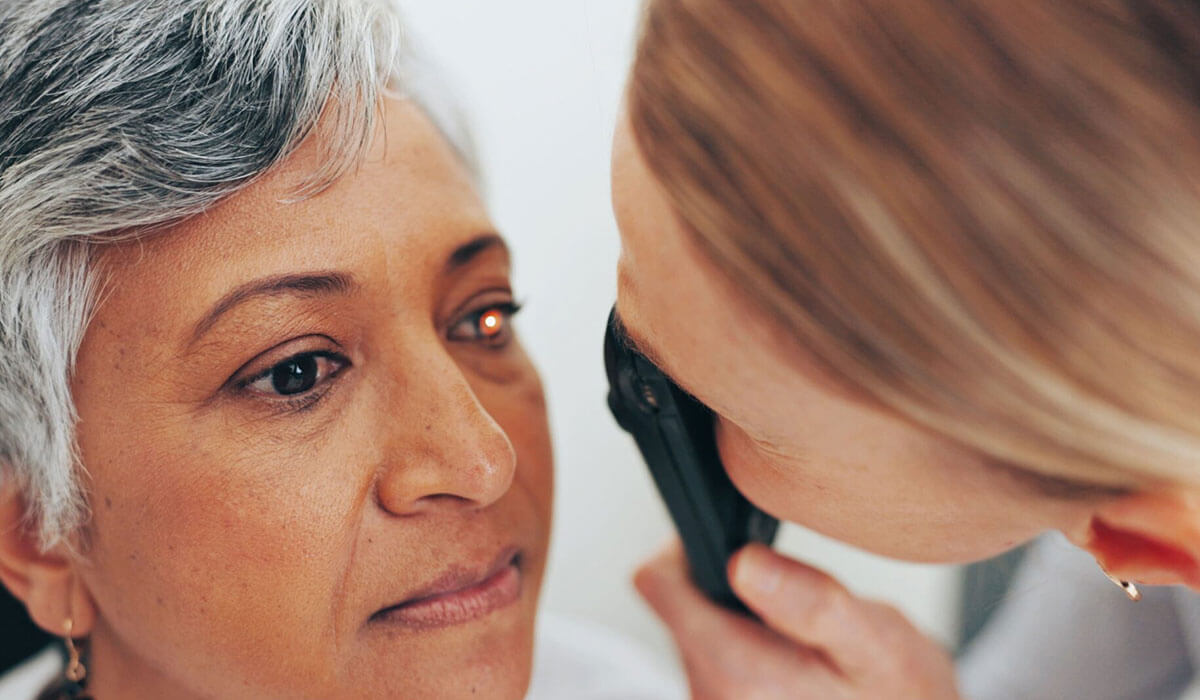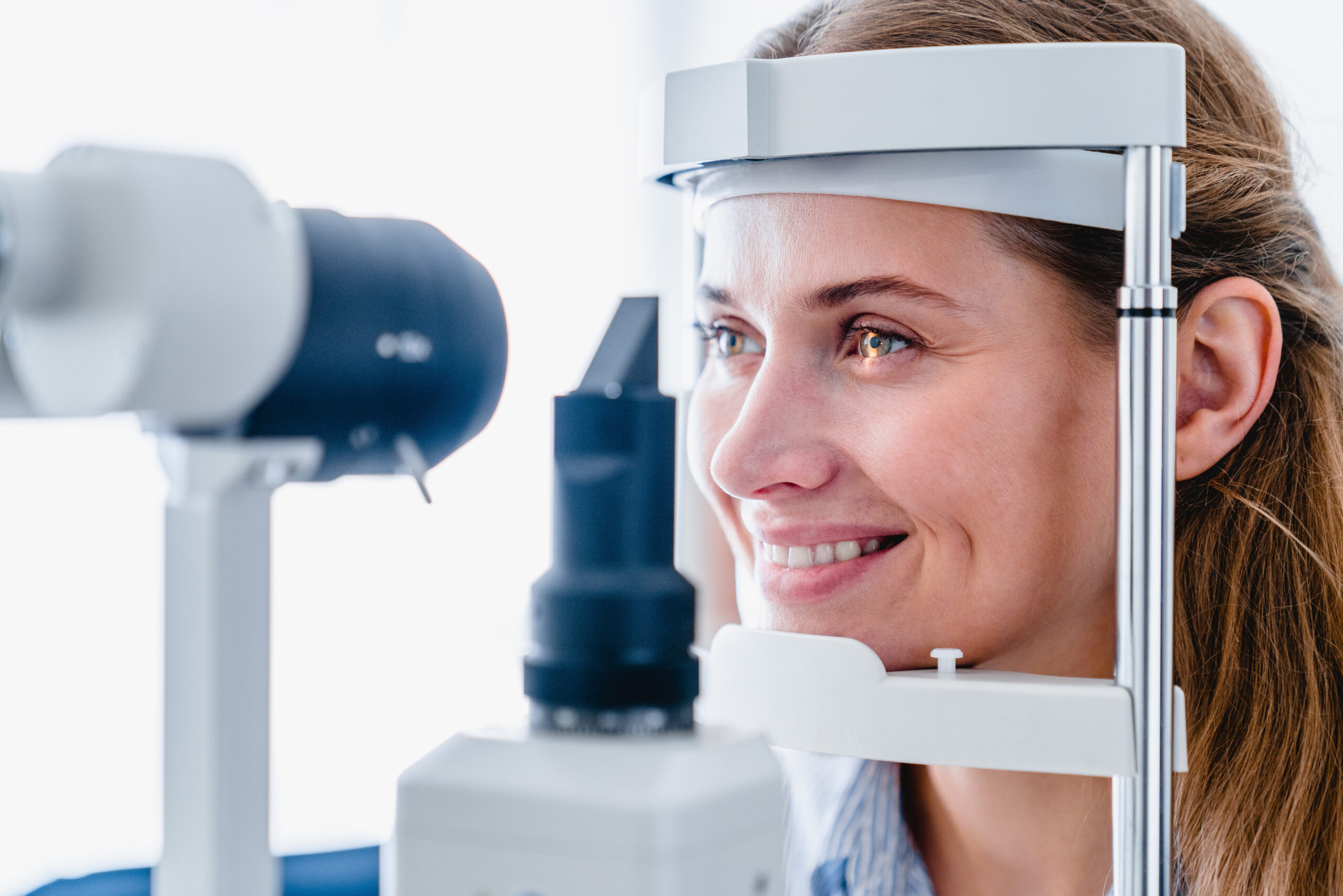
What Happens to Our Eyes as We Age?
As we grow older, our eyes change gradually. You may notice blurry vision, trouble reading fine print, or sensitivity to glare. These symptoms are common with aging, but sometimes they can also signal something more serious.
Conditions like cataracts, glaucoma, or macular degeneration (AMD) often begin with subtle symptoms. The earlier these are detected, the more options we have to protect long-term vision.
At Professional Family Eyecare, we help seniors and their families stay ahead of these changes with personalized exams, clear explanations, and follow-up care that fits your lifestyle.
Common Vision Problems in Seniors
Cataracts: Cloudy Vision Over Time
Cataracts develop when the natural lens in your eye becomes cloudy, which makes your vision look foggy or dim. You might notice more glare at night or need brighter light to read.
Cataracts are a normal part of aging and can be corrected with safe, effective surgery. We’ll help determine when the time is right and refer you to a trusted local surgeon if needed. We also offer cataract surgery co-management, providing support before and after your procedure to ensure a smooth experience.
Glaucoma: The “Silent Thief” of Sight
Glaucoma is a condition that damages the optic nerve, usually without early symptoms. It often begins with changes in peripheral vision and, if left untreated, can lead to permanent vision loss.
At each glaucoma screening and monitoring exam, we check your eye pressure and optic nerve health. Monitoring these changes closely allows us to slow the disease and protect your sight.
Macular Degeneration (AMD): Central Vision Loss
AMD affects the macula, the part of your retina that controls sharp, central vision. Early symptoms may include needing more light, seeing wavy lines, or difficulty recognizing faces.
We use advanced imaging to detect and track AMD. Many patients benefit from targeted supplements like MacuHealth, which supports retinal health and helps slow progression. We often recommend eye vitamins for AMD that are backed by the AREDS2 study, including MacuHealth and similar formulas.
How Often Should Seniors Have an Eye Exam?
Most adults over 60 should schedule a comprehensive eye exam once a year. If you’re managing glaucoma, AMD, or other conditions, we may recommend exams every six months to keep your care on track.
Even if your vision seems stable, regular checkups help us catch changes early when treatment is most effective.
What to Expect During a Senior Eye Exam
Our doctors take time to explain everything clearly, using modern tools to show you what we’re seeing. We’ll answer your questions, review your options, and recommend the next steps based on your individual needs.
If you need treatment outside of our office, like cataract surgery or AMD injections, we’ll coordinate with trusted local ophthalmologists and provide seamless follow-up care.
We also welcome family members to attend appointments. Having a loved one present can make it easier to understand new diagnoses, care plans, and treatment options.
Local, Accessible Eye Care for Every Age
We’re proud to care for patients from St. Marys, Greenville, Coldwater, Englewood, and beyond. Our offices are designed to be comfortable and easy to navigate for patients of all ages.
Need help getting to your visit? Ask us about local transit options. We’re happy to help connect you to a ride if it means you stay on top of your care.
Healthy Eye Habits That Help at Any Age
Dr. Carson Bruner, O.D., recommends a few simple steps for protecting vision as you age:
- Wear sunglasses with UV protection
- Eat plenty of fruits and vegetables rich in antioxidants
- Avoid tobacco and secondhand smoke
- Take eye-specific supplements like MacuHealth if you’re at risk for AMD
These small changes can make a lasting difference in your long-term eye health.
Common Questions About Senior Eye Health
1. What are the most common eye problems in older adults?
The most common age-related eye conditions are cataracts, glaucoma, and age-related macular degeneration (AMD). These can cause blurry vision, glare, peripheral vision loss, or difficulty with reading and night driving.
2. How often should seniors get an eye exam?
Most adults over 60 should have a comprehensive eye exam every year. Those managing glaucoma, AMD, or other conditions may need checkups every six months to monitor progression and adjust care.
3. Can aging eyes be protected from disease?
Yes. Early detection is key. Lifestyle habits like wearing sunglasses, eating antioxidant-rich foods, avoiding tobacco, and taking targeted supplements like MacuHealth can help preserve vision.
4. Is vision loss from cataracts or glaucoma permanent?
Cataract-related vision loss is often reversible with surgery. Glaucoma damage, however, is permanent, which is why regular monitoring and early treatment are critical to slowing progression.
5. Can seniors still live independently with AMD or glaucoma?
Yes, many seniors continue living full, active lives with the right eye care plan. Ongoing checkups, proper lighting, visual aids, and supportive family involvement can all make a difference.
When to Call Your Eye Doctor
Call us right away if you or a loved one notices:
- Flashes of light
- New floaters
- A dark curtain or shadow across your vision
These may be signs of retinal damage or detachment and require urgent care. Even if you’re unsure, it’s always better to get checked. We’re here to keep your eyes safe.
Senior Eye Care You Can Trust
Whether you’re managing glaucoma, monitoring AMD, or simply due for your annual exam, Professional Family Eyecare is here to help. We’ve proudly served generations of families in St. Marys, Greenville, Coldwater and Englewood, and we’ll treat you like family every step of the way.
Schedule your senior eye exam with Professional Family Eye Care and let us help you see clearly for years to come.

